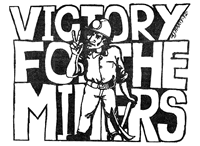
 |
Online
Archive
|
| Issue 3 - March 1972 |
| A Personal View |
 The
following is a statement from a miner who has been very active in the
area during the strike. He wishes to remain anonymous: The
following is a statement from a miner who has been very active in the
area during the strike. He wishes to remain anonymous:
"Dunston and Stella power stations were successfully picketed during the strike. There was no violence and lorry drivers and others were very sympathetic towards the strike. They refused to take their lorries past the pickets. The police, on the whole, were good and at times actually advised deputies not to go past the pickets into the pits, telling them that they did it at their own risk and that their actions could comprise provocation. "Over the past few years the ratio of deputies to men has decreased appreciably. Westoe had 200 men at the pit during the strike doing safety work - pumping etc - when 50 would have been enough. "95% of claims of damage in pits due to safety work not being carried out are false. Hydraulic supports, which are used in the majority of pits, usually last the lifetime of the face. The NCB should concentrate as much on safety during normal working times as they did during the strike. "The north-east will support the Enquiry if directed to by the NUM National Executive. But the National Executive has been extremely fortunate in coming out of this (the strike) in one piece and with the leadership cult thing continuing, had the NUM Executive been offered £3 immediately prior to the strike then they would almost certainly have recommended the miners to accept it. There was sufficient militancy to prompt the National Executive to further action. "The National Executive's inertia has been apparent throughout the strike and the victory is one of the rank and file over a limited, anachronistic union bureaucracy. There is a good case for the voting on the National Executive to be made known to the miners, so that they are aware of the particular way the Executive members voted. "Throughout the Trade Union movement we want accountability of full-time officials by periodic re-election and the democratisation of TU rules and regulations, so that the rule book would cease to be the policeman of the rank and file."
Heath must know that he can't afford to let a crisis like this happen again - and it could very easily - for example, the railwaymen could prevent deliveries of coal to power stations by picketing, as most coal is delivered by rail. Therefore the government may well try to introduce an alternative 'safe' fuel to power stations for the future. Was this what they had planned all the time? They've given the miners £113m. If they'd done this before the strike they'd have saved millions (far more than the total pay offer was worth) in lost machinery, SS payments, lost production in industry etc. It remains to be seen whether Heath and Carr's failure to act during the first weeks of the strike was part of a deliberate policy to run down the mining industry. They could have been using talk of deterioration of pits during the strike as an excuse to close less efficient mines, thereby speeding up the process of phasing out the use of coal as a power source without causing a national outcry about redundancy. On the other hand, they may have been waging a propaganda war through the news media --propaganda that was largely ineffective. Certainly for the moment all 289 of the country's pits have reopened, and only 22 faces out of a total of over 1,000 have been sealed (and 11 of these were in a very poor condition before the strike). Only the next year will show if all these pits will remain open. The very success of the miners' picketing has probably ensured that the government will try to prevent such tactics in the future. A government spokesman said just after the strike: "that we shall have to review the law on picketing is in no doubt, and we will."
|